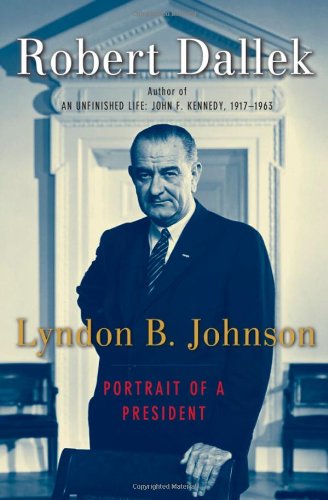
Lyndon B. Johnson
Portrait of a President
کتاب های مرتبط
- اطلاعات
- نقد و بررسی
- دیدگاه کاربران
نقد و بررسی

November 15, 2003
Few modern presidents have been the subject of as many excellent biographies as Lyndon Johnson, and this abridgment of Dallek's masterly two-volume biography, Lone Star Rising and Flawed Giant, is a welcome addition to the literature. Dallek (An Unfinished Life: John F. Kennedy, 1917-1963) offers a rarity-a brief but thorough life of Johnson, now 30 years after his death. This abridgment is aimed at students who may be daunted by Dallek's lengthy two volumes or Robert Caro's projected four-volume investigation. (Caro's third volume, Master of the Senate, received the Pulitzer Prize.) This book is also excellent for all readers who want a refresher or introduction to Lyndon Johnson. Dallek skillfully discusses Johnson's political triumphs (civil and voting rights, Medicare and Medicaid, federal aid to education) and failures (Vietnam, the promise to end poverty) and portrays his complex, larger-than-life personality. He concludes that Lyndon Johnson will be remembered as a President who mirrored the best and the worst of his memorable times. See also Irwin and Debi Unger's LBJ: A Life, another worthy one-volume treatment. Dallek's abridgement is no replacement for his two-volumes, based on 14 years of research, but it is a fine addition for all public libraries.-Karl Helicher, Upper Merion Twp. Lib., King of Prussia, PA
Copyright 2003 Library Journal, LLC Used with permission.

November 15, 2003
Until Robert Caro completes his multivolume opus, Dallek's two-volume LBJ biography is the best one available. Dallek's work reflects impressive detachment toward a figure about whom few were neutral, least of all LBJ himself. He inherited an elevated sense of self, according to Dallek, who describes the Johnson family's relatively high place on the local social ladder despite their poverty. But LBJ's ego was strangely fragile and self-pitying, and in the conclusion, Dallek questions, after narrating the fateful decisions to escalate the Vietnam conflict, Johnson's "capacity to make rational life and death decisions." He lived and conducted politics as a personal enterprise, as Dallek's account of LBJ's wheeling-and-dealing rise from congressional aide to president illustrates. On the un-seamy side, Dallek credits LBJ's personal experience with poverty as a motive in his championing the social and civil rights enactments of the 1960s. In Dallek's hands, Johnson is complex, deceitful, and idealistic, and the author shows why the man's legacy, both positive and negative, will always command interest and debate.(Reprinted with permission of Booklist, copyright 2003, American Library Association.)

























دیدگاه کاربران